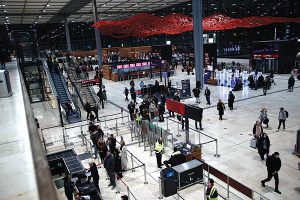Bloomberg
Shuttering Berlin airport for more than two hours and upsetting the travel plans of thousands of passengers proved little more challenging than a walk in the park for four climate protesters.
Video footage of the runway invasion shows two of them calmly pushing a bicycle along a country path before slipping through a hole in the perimeter fence as a third holds back the newly cut wire and the fourth films.
Clad in high-visibility jackets, they then stroll across the grass before gluing themselves to taxiways and cycling around the apron after making an emergency call to inform police of their presence.
The ease of the incursion demonstrates the vulnerability of even some of the world’s busiest airports as groups pledged to fight global warming single out aviation as a prime target for disruption as it struggles to cut carbon emissions. Perimeters that stretch for many miles — 13 in the case of London Heathrow, Europe’s busiest hub — are tough to monitor and police, though security measures are more formidable in some countries than others.
“It’s absolutely outrageous and there should be a serious investigation,†Anthony Glees, emeritus professor at the University of Buckingham in England and an expert in airport security, said of the events at Berlin Brandenburg. “Getting anywhere near the runway is an absolute no-no.â€
While the maintenance of the Berlin fence is the responsibility of the airport company, stopping unauthorised people from crossing the perimeter is a task for Germany’s federal police, who have previously warned that the split creates security vulnerabilities and sought to take on increased powers.
Unlike in the UK and France, monitoring of extremist groups that could attack or disrupt major infrastructure is also performed by a patchwork of regional security agencies, with Berlin’s having just 257 staff.
Data and personal privacy concerns mean there are also restrictions on closed-circuit television in public places, with cameras generally outlawed away from locations such as train stations and airport terminals themselves. Routes approaching Berlin Brandenburg, located on the southern fringes of the German capital, may therefore have gone unmonitored.
“There are multiple cultural problems with the delivery of day to day security in Germany,†Glees said. “Germans don’t like intelligence-led activity because it reminds them of the Third-Reich or the Stasi.â€
Parts of Frankfurt airport were evacuated for several hours in 2018 after a family was allowed to pass through security despite testing positive for traces of explosives, before being located and cleared following further checks.
Flying, though, is the most CO2-intensive form of travel, and while it accounts for around 2% of global emissions at present that’s likely to reach 22% by 2050, according to a European study.
 The Gulf Time Newspaper One of the finest business newspapers in the UAE brought to you by our professional writers and editors.
The Gulf Time Newspaper One of the finest business newspapers in the UAE brought to you by our professional writers and editors.
